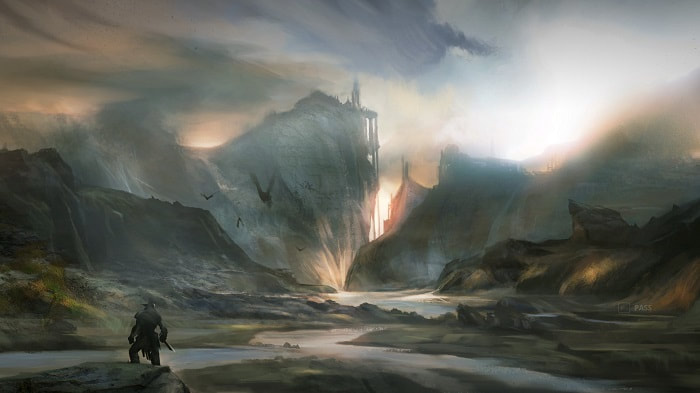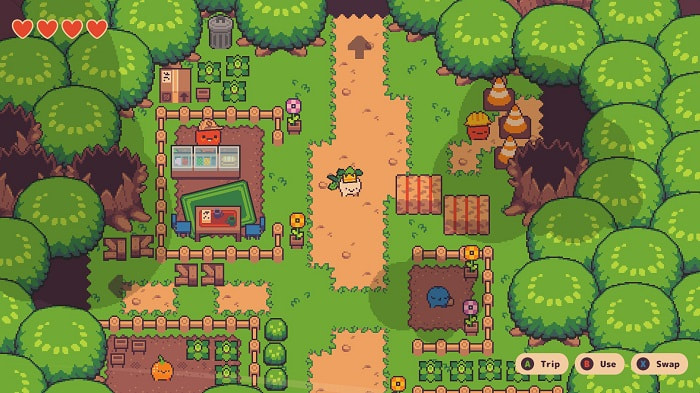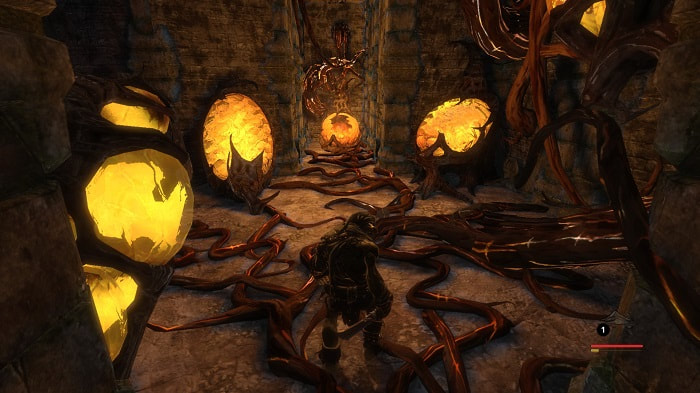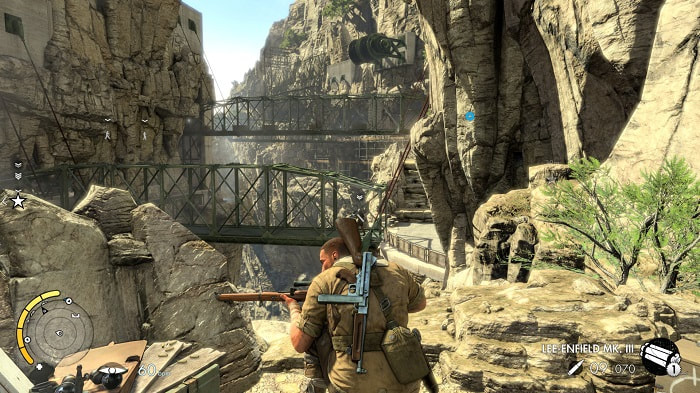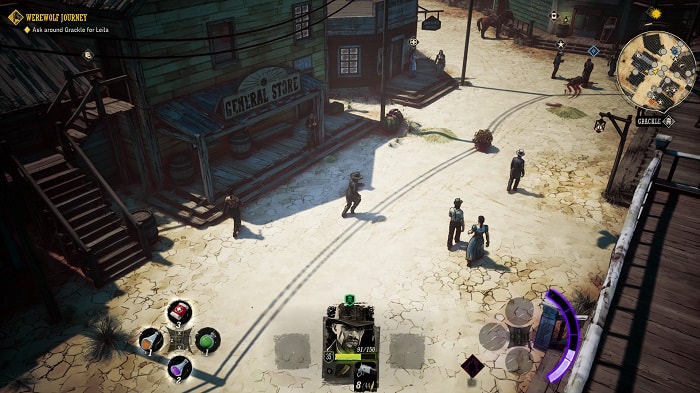|
Appropriately enough given the state of the world, I start this month's games roundup with the post-apocalyptic tactics game Mutant Year Zero: Road to Eden (2018). Later in March I tapped into the cultural zeitgeist - as I always do! - by going full goblin mode in the excellent stealth game Styx: Master of Shadows (2014).
Strap in, because this month's roundup is, happily, a particularly long one. There are a total of seven games to cover, even if one is technically "just" a DLC. On Entertainium duties, I also got the chance to cover a new game I'd been looking forward to. Sadly, Weird West didn't live up to my personal expectations, but I'm aware that I'm in the minority on that front.
Mutant Year Zero: Road to Eden (2018)
Developed by The Bearded Ladies, published by Funcom
The XCOM games have become the go-to reference when talking about turn-based tactics, to the extent that it’s actually quite difficult not to mention them. Obviously, I’ve failed in that respect once again. When playing Mutant Year Zero, the familiar XCOM formula initially seems to be in place. Over time, though, the game gradually proves itself to be something quite different. Crucially, the game isn’t fully turn-based. Instead, the player explores the area with a small squad in real-time, sneaking around and trying to find the optimum position from which to strike. It’s essential to do this, as combat is very challenging. In fact, no game has made me feel so completely like a plucky underdog, pulling out victory against the odds.
Mutant Year Zero is based on a Swedish tabletop RPG, although you could easily play it without knowing this - and most people have, honestly. The post-apocalyptic setting is of the leafy, overgrown type as opposed to the desolate, desert Mad Max type. I really appreciate the mix of tones in the game. On the one hand, it is bleak and tragic to see the ruins of a world devastated by war decades ago. On the other hand, Mutant gets a lot of clever humour out of its premise. The loveable mutant rogues that serve as protagonists know hardly anything about the world of the “before times”, and so they come up with amusing explanations for commonplace items like a telescope or a boombox. While it’s a harsh and demanding experience, I’d recommend that any fan of tactics games give this one a go.
SteamWorld Quest: Hand of Gilgamech (2019)
Developed by Image & Form, published by Thunderful
I’ve praised the SteamWorld series more than once, particularly the excellent SteamWorld Heist (2015). Unfortunately, Quest really did not land for me and I found it to be a real disappointment - albeit one which I may attempt again at some point.
Image & Form switched up the genre again for this game, choosing to try a deck-building card battler in the vein of, say, Slay the Spire. As the title implies, Quest is set in a distant fantasy past as opposed to the distant sci-fi future of the other games in the series. A lot of the familiar strengths are here, like colourful visuals, likeable characters, and amusing dialogue. The deck building system is also generally solid. The trouble is that a lot of the rest of the game feels flat, lifeless, and honestly a bit of a waste of time. What passes for gameplay between the battles is plodding around some maze-like, static backdrops which lack any kind of atmosphere. The battles themselves are often frustratingly grindy, with enemy health which inflates at an even higher rate than my gas bills. This is a game I both wanted and expected to like, and yet I haven’t been able to and I’m surprised its flaws were so easily overlooked by most reviewers in 2019. I’m still hopeful that the team, which recently merged into publisher Thunderful, can get back on track with their next game, SteamWorld Headhunter.
Turnip Boy Commits Tax Evasion (2021)
Developed by Snoozy Kazoo, published by Graffiti Games
It takes just two hours to play, it’s a riff on early Zelda games and it has a live, albeit mute, brassica for a hero. It’s fair to say that Turnip Boy Commits Tax Evasion is some way outside of my usual wheelhouse. However, this brief but charming vegetarian excursion was just what I needed to offset some of the meatier games I played in March.
It’s set in a world populated by anthropomorphic fruit and veg, fronted by our turnip hero and his many-layered nemesis Mayor Onion. There are also cherries, oranges, carrots, a grave-robbing potato, an avocado explorer, and more besides. This simple but colourful game is structured around a series of tasks which the Mayor sets for Turnip Boy, ostensibly to pay off his tax debt. The mix of combat and puzzles is broadly very easy, but it changes up enough over the short play time to keep things interesting. The best feature is the humour, with the various talking perishables delivering a lot of genuinely funny dialogue. The jokes will come across better if you’re Extremely Online, but it’s all good-natured stuff. There’s even an included DLC, a selection of collectible hats, and a god mode toggle if things get too rough. The only downside is that it doesn’t count as one of your five a day…
Styx: Master of Shadows (2014)
Developed by Cyanide Studio, published by Focus Home Interactive
I wasn’t at all familiar with French outfit Cyanide Studio until quite recently, even though they have been around since 2001. That’s not too surprising, as they’ve always been heavily involved in sports games, which is one of the few genres I’m almost entirely uninterested in. They finally appeared as a blip on my radar in February 2021, when I reviewed Werewolf: The Apocalypse - Earthblood. This stealth-action game got a mixed reception overall, but I was one of its few cheerleaders. In fact, I liked its moonlit shape-shifting so much that I put it on my list of favourite games last year. I resolved to seek out earlier games by the same team, and that brought me to Styx: Master of Shadows.
It turns out that this fantasy stealth game has a small cult following among hardcore stealth fans, and I can definitely see why. If SteamWorld Quest was my regrettable disappointment of March, then Styx has been my surprise gem. Casting players as the grubby, cynical goblin of the title, the game is set in the vast Tower of Akenash, populated by oppressive humans and elves. The stealth systems are comprehensible, well-developed and tense. By far the game’s biggest asset, though, is its absolutely superb level design. Non-linearity and verticality are often merely buzzwords which devs and PR people like to throw about, but Styx is genuinely brilliant in these departments. I hope to share more thoughts on Styx, but in the meantime suffice it to say that I thoroughly recommend it to stealth fans, especially as it often costs mere pennies during sales.
Sniper Elite III (2014)
Developed and published by Rebellion Developments
I feel like I should really be a loyal follower of Rebellion, because not only are they a long-standing British developer and publisher, but they’re also based just down the road from me in Oxford. In fact though, I’ve only ever played a couple of the games they’ve released over their long history. Fellow Entertainium staffer Gareth and I sought to rectify that in March, as we tackled Sniper Elite III in co-op mode.
There’s something quite no-frills about the game, particularly the fact that it makes almost no attempt to tell a story. Bizarrely, I’m not sure that its main character - Karl Fairburne - is ever explicitly named in the game, which is a vanishingly rare quirk. The surprisingly varied and large environments set in North Africa are easily one of the game’s strongest elements. Skulking around in the dark, picking off sentries with a suppressed Welrod pistol and then lining up the perfect sniper shot from hundreds of metres away takes a long time to get old. It seems a little unfortunate that some of the best levels in Sniper Elite III are actually in its DLC packs, which relatively few people will have played at the time of release because of how unreasonably expensive they were (and still are, if the game isn’t on sale). I hope to catch up with Sniper Elite 4 at some point, as Sniper Elite 5 is expected later in 2022.
Doom Eternal: The Ancient Gods parts 1 and 2 (2020, 2021)
Developed by id Software, published by Bethesda Softworks
I finally got around to playing Doom Eternal back in February, and in March I got around to battling through its two-part DLC expansion, The Ancient Gods. In a nutshell, this is a superb continuation to a brilliant game. As many others have observed before me, The Ancient Gods doubles down on every feature of the main game. The arena battles are more intense, the platforming is faster-paced, there are numerous new mechanics added, and the plot is even more nonsensical (and who knew that was possible?). The overall impression is of id Software being supremely, and justifiably, confident in their creation. While exploration is hardly a big feature of Doom Eternal, the added levels are very varied and frequently beautiful to look at, as linear as they are.
Some of the additions are very clever and reflect id Software’s deep understanding of their game. Stone imps, for example, are a new demon variant which effectively demand that players use the full-auto mod for the combat shotgun. This makes sense, because typically the grenade launcher mod is far more useful. Similarly, the new spirit demon requires usage of the microwave mod for the plasma gun. The developers provide all the needed opportunities to use all the tools available to the player, be they new ones or old favourites, and it helps make The Ancient Gods a constantly enthralling, if exhausting, experience. Now that Doom Eternal has passed its second anniversary and is reaching the end of its lifespan, we can only wait and wonder what id Software has in store next.
Weird West (2022)
Developed by WolfEye Studios, published by Devolver Digital
Once again, I find myself in the minority. I’ve been playing action RPG Weird West in order to write my review for Entertainium, and it turns out that I like the game quite a bit less than many other writers. Developed by a new studio co-founded by ex-Arkane staff - of Dishonored and Prey fame - Weird West has won a lot of plaudits for its interactivity and “immersive sim” elements. There’s no doubt that the game has an ambitious and interesting design; where I disagree with most reviews is that I don’t think it’s been delivered on to a satisfying exent. The game has a dizzying number of features and interlocking systems, but for me, too many of them feel highly underdeveloped.
The clearest example is the posse system, which lets players recruit up to two AI-controlled allies. It’s a nice idea, but so crudely implemented. The AI is strikingly poor, to the extent that these gunslingers will struggle to follow the player if they have the temerity to, say, jump across a small gap. I also feel that the skill system feels hollow and uninteresting. Almost none of the skills connect with the game’s rudimentary stealth system, and when you play as a werewolf there are no skills at all which have anything to do with being a werewolf. The only thing more baffling to me is that some reviewers find the threadbare story to be interesting. I’m only so harsh here because Weird West was one of the games I was most looking forward to this year. A lot of players will like it a lot, and GamePass will let many curious people give it a go. I just find myself wishing that WolfEye hadn’t attempted such a recklessly ambitious project for their first time out.
That brings an end to this month's entry. The next roundup will cover April, and should be published in early May. I'll be covering the brilliant Half-Life remake Black Mesa (2020), survival game Subnautica (2018), and two new 2022 indie games.
In the meantime, please consider supporting the site via Patreon, and remember that all articles are available in a podcast version which can be found on all the main services and via the link below.
0 Comments
Your comment will be posted after it is approved.
Leave a Reply. |
About
Exploring classic science fiction, with a focus on the 1950s to the 1990s. Also contributing to Entertainium, where I regularly review new games. Categories
All
|
